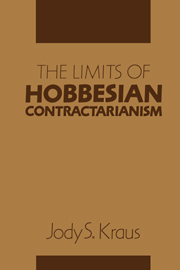5 - Gauthier's moral contractarianism
Published online by Cambridge University Press: 05 June 2012
Summary
Hobbesian contractarianism is traditionally thought to be a political theory, one which purports to refute the anarchist and establish the conditions for the legitimate exercise of political coercion. But the province of political theory is not entirely independent from other normative inquiries. Indeed, it might be argued that much of political philosophy, properly conceived, falls within the larger rubric of moral theory, insofar as its defining inquiry concerns the nature of the justification or legitimacy of political authority. For the question of whether a political authority is legitimate is the same question as whether that authority is morally justified. It should be unsurprising, then, that the contractarian framework might serve not only as a theoretical approach to understanding the question of political legitimacy, but also as a perspicuous methodology for exploring the nature of moral justification in general. In fact, it would be surprising if in the course of any theoretical exploration of the nature of political legitimacy, the question of moral justification did not also arise in its own right. This prediction is borne out in Hampton's work, where Hobbes's justification of the state is seen to depend on a meta-ethical reduction of morality to individual rationality. Similarly, in Kavka's enterprise, the normative force of agreement in his hypothetical negotiation scenario is seen ultimately to depend upon whether that scenario adequately embeds certain fundamental moral ideals.
While the search for political justification will inevitably lead to some meta-ethical inquiry, the latter is an important and arguably more foundational topic in its own right.
- Type
- Chapter
- Information
- The Limits of Hobbesian Contractarianism , pp. 254 - 309Publisher: Cambridge University PressPrint publication year: 1993



